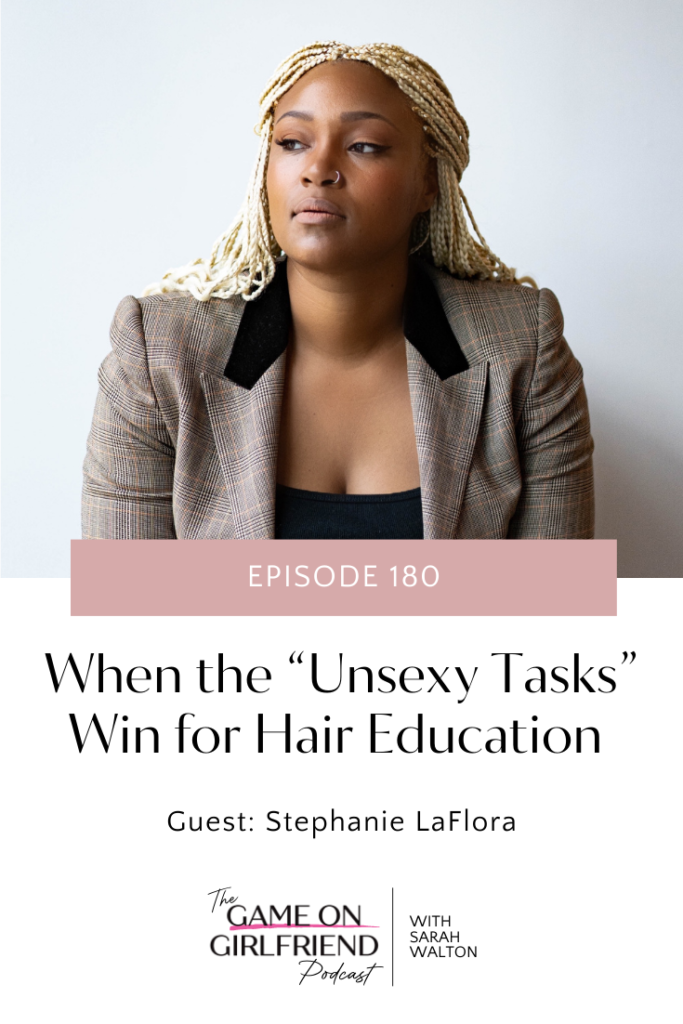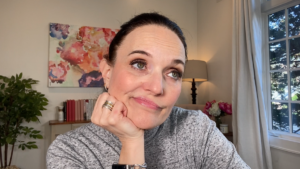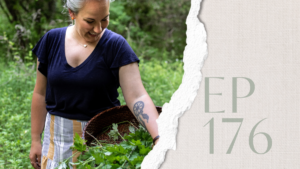Episode 180: When the “Unsexy Tasks” Win for Hair Stylist Education with Stephanie LaFlora

Stephanie LaFlora was a consumer who was turned into a beauty business owner to shake up the industry. As a consumer, hair salons constantly rejected her because they didn’t know how to style her hair when all she wanted was a wash and a blow dry. She later learned that cosmetology schools weren’t teaching their stylists how to style or care for curly or oily hair.
Driven to solve the problems of her own customer experience and already a serial entrepreneur, storyteller, marketer, and creator, Stephanie founded Crownhunt to make life easier for people with curly hair while helping under-resourced entrepreneurs thrive. To that end, Crownhunt is a digital marketplace for textured hair, built to help existing hair entrepreneurs reach the 65% of the population with textured hair and to get their products, services, and education to the right people more effectively.
Nightmare experience finding hair stylists
Stephanie realized she’d always found her stylists through word-of-mouth. After she moved, she had no one to help her find a hairstylist, and calling around to local salons found her turned away in their lobbies when they realized they didn’t have the knowledge to style her hair.
At first, Stephanie said she was worried that she’d moved to a place where she would not be welcome. Being turned away so many times, even graciously, felt personal. She knew she wanted to solve the problem, but step one was still trying to find someone who could do her hair.
She sought out hair braiders, recognizing that there was likely a cultural aspect to her search.
“I found a braider who is incredible. And what's so funny is once I got my hair braided, I would be walking around the city, and I would have black women that I do not even know literally cross the street to say ‘Hey, hold on one second, let me talk to you.’
“And they will come over here and would say, ‘Who did your hair?’ And that happened to me everywhere I went because I wasn't the only person having this problem. So that validated for me that this is a real thing that I should solve,” says Stephanie.
Running a focus group
She kicked off a focus group where it was revealed the opportunity was even bigger than she imagined.
She turned her search to hair educators and reached out to stylists and hair product suppliers to create a focus group to identify the common gaps in their customer journey.
Over a three-hour Zoom call, each group mapped out their process answering questions like “How do clients find you? How did you get your education? Do you sell products? etc.”
They identified three separate places that were the most urgent to create resources for. At launch, they did an e-commerce library of classes, and 2,500 people signed up.
Hair stylist and tech industry comparison
“People who know me have always known me as a person who changes my hair a lot and does so it just felt like it just aligned in so many ways with my interests. It's something that is actually addressing a cultural problem, but it's addressing it from a unique angle. And I have spent a lot of time in companies that are always trying to change the world, and my experience of that is that it becomes more about ego very than it actually does with impact,” says Stephanie.
Stephanie looked at the resources at her disposal as a tech industry worker and compared them to the hair industry. With millions of hairstyles in the country, there was a lack of resources to help people.
"The average hairstylist has to figure out their own health benefits, they have to find all their own customers, they have to rent their workspace often that they're in, and they are usually like 22 years old. They went to school for two years, they went to cosmetology school, cosmetology school and teach them how to do 65% of people's hair in the country and they barely ever teach business. So you are effectively a 20 year-old entrepreneur with no business skills and lacking the skills to do half the people in the country's hair,” says Stephanie.
Why is this the case? According to the U.S. Equal Employment Opportunity Commission, 83% of the tech executive is white, and 80% are men. “The hair industry is 91 percent female and 38 percent BIPOC,” says Stephanie.
She says the stylist feedback has been positive, but it’s a continued exploration. She found that the hair industry itself is very insular.
“You’re talking about a group of entrepreneurs who figured out how to make it. Those are the best ones to invest in. ... They are the ones that have figured out how to make it by any means necessary with no support. Those are the ones that really can leverage actual support,” says Stephanie of the stylists.
“We are still figuring it out now,” says Stephanie, who will be kicking off a Mastermind with The Hair Academy for continued feedback. She says it’s worth investing in feedback that is aligned with your next steps in business, so you’re taking those steps from an informed place.
Experience as entrepreneur in 2023
Crownhunt is Stephanie’s first startup. She notes running a business is a very psychological process. As a black woman, a wife, and a mother, she says there is so much you receive and have received throughout the duration of your life that subtly and not so subtly tells you “you can’t do it, and even if you could do it, you can’t do it the way you want to.”
“There will be some major compromise that you need to just succumb to in order actually to pull it off, and you’ve got to fight that in your brain. It’s a journey and it depends on where you come from and what your life experiences are, how heavy or how loud those voices might be.”
Stephanie credits her years in tech with helping her perspective and belief in what was possible in her life. Even then, she notes that in 2022, Crownhunt was one in 100 companies to receive venture capital funding as a black, woman-owned business.
“You will likely hit every obstacle that you can imagine ... what will you draw from? What will be your support in that season?”




